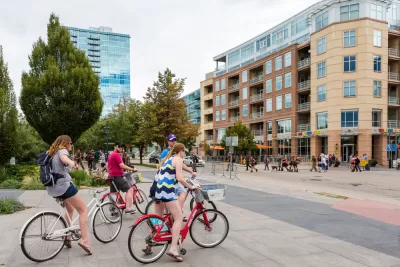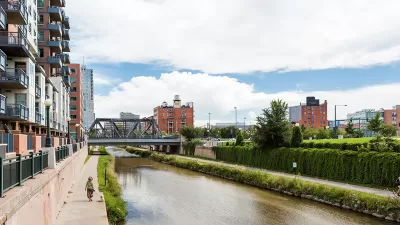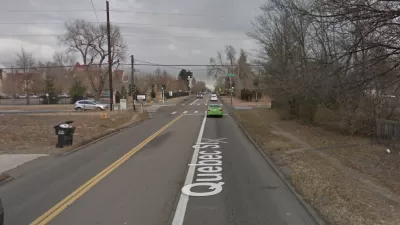The Denveright plan puts pedestrians first, but could do more for public transportation and bikes, says a critique from Streetsblog Denver.

A new Streetsblog Denver series unpacks the implications of Denveright, the recently released suite of plans that together form a comprehensive vision for the city's future growth. The piece of the new package guiding land use and transportation for the next 20 years is Blueprint Denver—and at this stage, it's receiving mixed reviews from writer David Sachs.
Blueprint's revamped framework for street design calls for every street in the city to prioritize walking over other modes of transportation, and explicitly acknowledges the trade-offs that will require, like slowing vehicle speeds and reducing street parking. But it stops short of adopting a full complete streets policy by not extending public transit or bicycle infrastructure throughout the city. Sachs reports:
City planners opted against recommending a "complete streets" policy, a simple directive that compels planners and engineers to favor pedestrians, bicyclists, transit riders, and cars — in that order — on every street … Instead, Blueprint creates a more complex “modal priority” network [PDF]. Maps identify where walking should dominate (all streets), where biking is the street’s main function, and where transit is the priority. Some streets will prioritize all three modes.
As Sachs points out, many of the corridors projected to absorb a large share of new population and job growth were among those not chosen to receive bike infrastructure.
FULL STORY: Denver’s New Blueprint for Growth Puts Peds First, But Every Street Won’t Be “Complete”

Alabama: Trump Terminates Settlements for Black Communities Harmed By Raw Sewage
Trump deemed the landmark civil rights agreement “illegal DEI and environmental justice policy.”

Study: Maui’s Plan to Convert Vacation Rentals to Long-Term Housing Could Cause Nearly $1 Billion Economic Loss
The plan would reduce visitor accommodation by 25% resulting in 1,900 jobs lost.

Planetizen Federal Action Tracker
A weekly monitor of how Trump’s orders and actions are impacting planners and planning in America.

Waymo Gets Permission to Map SF’s Market Street
If allowed to operate on the traffic-restricted street, Waymo’s autonomous taxis would have a leg up over ride-hailing competitors — and counter the city’s efforts to grow bike and pedestrian on the thoroughfare.

Parklet Symposium Highlights the Success of Shared Spaces
Parklets got a boost during the Covid-19 pandemic, when the concept was translated to outdoor dining programs that offered restaurants a lifeline during the shutdown.

Federal Homelessness Agency Places Entire Staff on Leave
The U.S. Interagency Council on Homelessness is the only federal agency dedicated to preventing and ending homelessness.
Urban Design for Planners 1: Software Tools
This six-course series explores essential urban design concepts using open source software and equips planners with the tools they need to participate fully in the urban design process.
Planning for Universal Design
Learn the tools for implementing Universal Design in planning regulations.
Caltrans
Smith Gee Studio
Institute for Housing and Urban Development Studies (IHS)
City of Grandview
Harvard GSD Executive Education
Toledo-Lucas County Plan Commissions
Salt Lake City
NYU Wagner Graduate School of Public Service





























